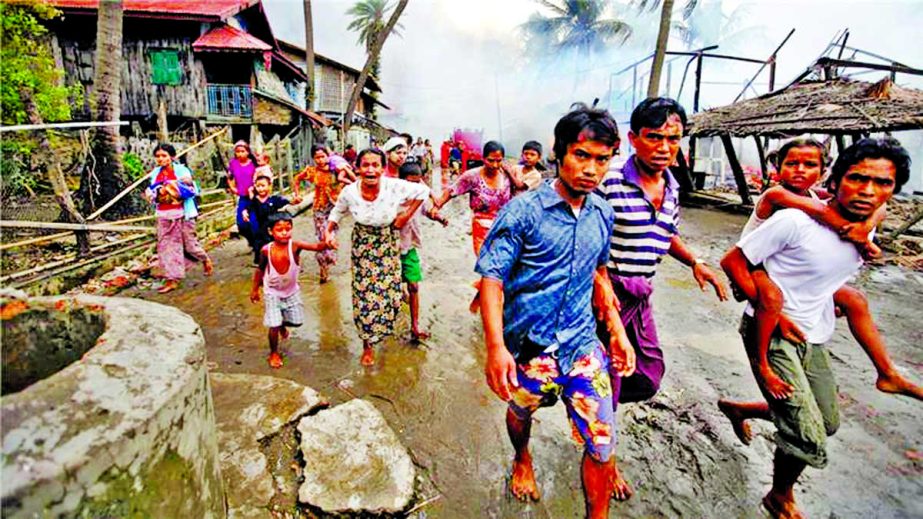
The Myanmar army on Sunday forcibly removed Rohingyas from a village in a crackdown following attacks on border security forces. Hundreds of Myanmar’s Rohingya villagers had been facing a second night hiding in rice fields without shelter according to news agencies
Reuters said four Rohingya sources contacted by it over telephone, said border guard officers went to Kyee Kan Pyin village on Sunday and ordered about 2,000 villagers to abandon it, giving them just enough time to collect basic household items.
The move marks an escalation in violence which has destabilised Myanmar’s most volatile state located in the remote northwest. In Rakhine, relations between the Rohingya and majority Buddhists have hit their lowest point since hundreds of people were killed and thousands displaced in ethnic and religious violence in 2012.
The government, led by Nobel Peace Prize winner Aung San Suu Kyi, has said the army and police in Rakhine are fighting a group of at least 400 insurgents, drawn from the Rohingya Muslim minority, with links to Islamist militants overseas.
Al Jazeera News: adds UN human rights experts want Myanmar to investigate allegations that security forces have killed unarmed civilians, burned villages and made arbitrary arrests in a Muslim-majority region where a crackdown has followed attacks on border police.
Aid agencies say up to 15,000 people, believed to be mostly Rohingya Muslims, have been displaced since armed men launched coordinated attacks on three posts along the northwestern border with Bangladesh on October 9.
The government, which is led by the party of Aung San Suu Kyi, a Nobel Peace prize winner, has characterised the response of security forces as a carefully targeted sweep of northern Rakhine state’s Maungdaw township in search of the perpetrators.
Officials say security forces have killed 30 “attackers” and detained 53 suspects while searching for 400 suspected Rohingya fighters, who seized weapons from border police. Rights group and sources from the mostly stateless Rohingya community say civilians are bearing the brunt of the military-led operation.
They say the death toll from the violence is higher than reported.

Yanghee Lee, the UN envoy on human rights in Myanmar, said she had received “repeated allegations of arbitrary arrests as well as extrajudicial killings occurring within the context of the security operations conducted by the authorities in search of the alleged attackers”.
“What troubles me most is the lack of access for a proper assessment of the true picture of the situation there at the present moment,” Lee said in a statement from Geneva on Monday.
“The blanket security operations have restricted access for humanitarian actors with concerning consequences for communities’ ability to secure food and conduct livelihood activities,” Lee added.
Investigations urged
The UN’s special envoys on summary executions, internally displaced persons, and torture also joined Lee’s call for “proper and thorough investigations of alleged violations”.
Rohingya community leaders and local residents said on Monday that hundreds of people had been hiding out in rice paddies near their village since soldiers allegedly ordered about 2,000 people to leave their homes on Sunday. According to the UN Office for the Coordination of Humanitarian Affairs (UNOCHA), aid agencies still have no access to the 10,000 to 15,000 people thought to have been displaced from their villages by the latest violence in Rakhine.
An additional 3,000 people from the ethnic Rakhine Buddhist community have fled to monasteries, schools and camps, the agency said in an update Monday.
Food aid is not reaching 50,000 “food-insecure people” and 65,000 school children in Maungdaw township who normally receive World Food Programme assistance, said UNOCHA.

